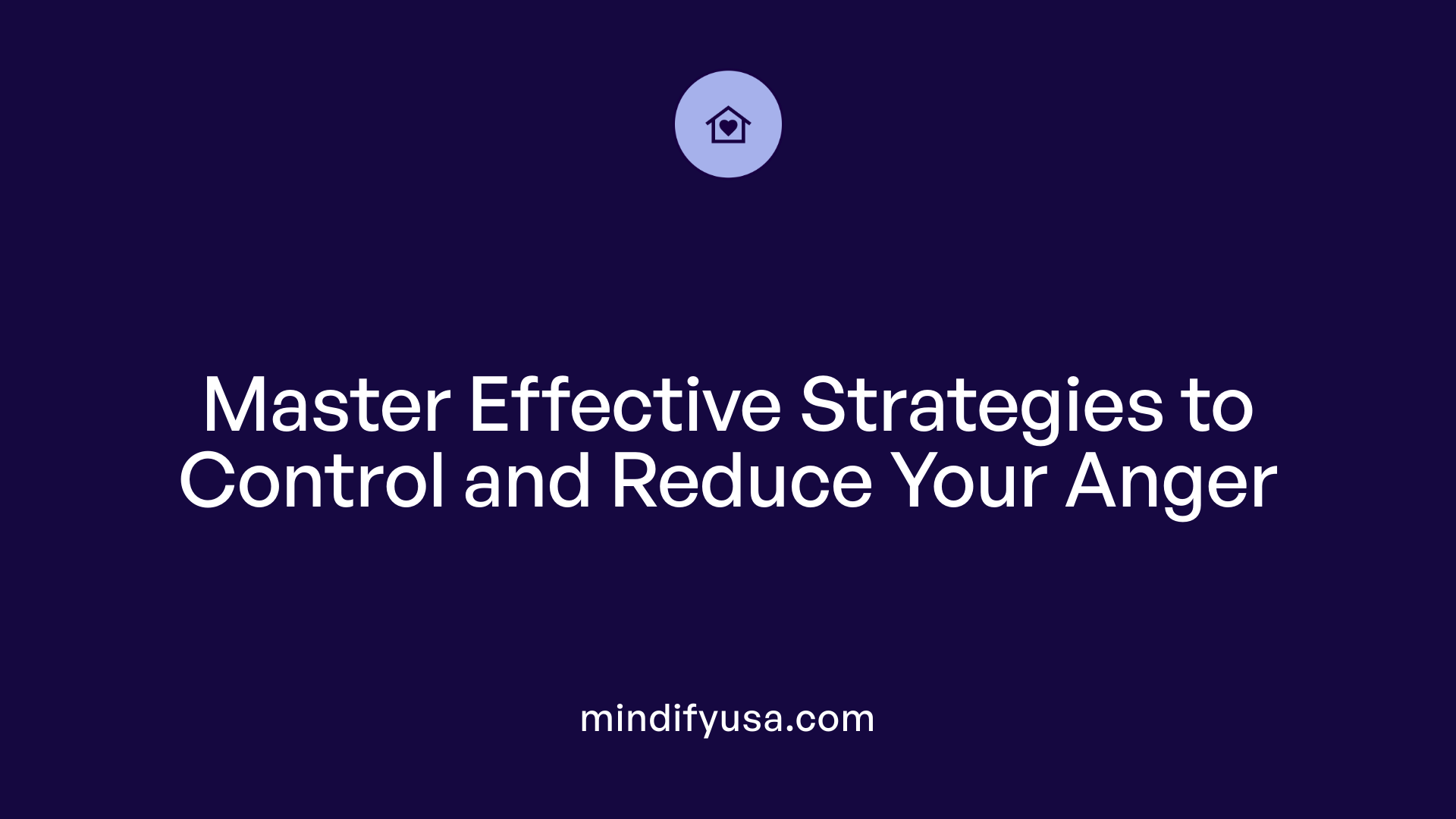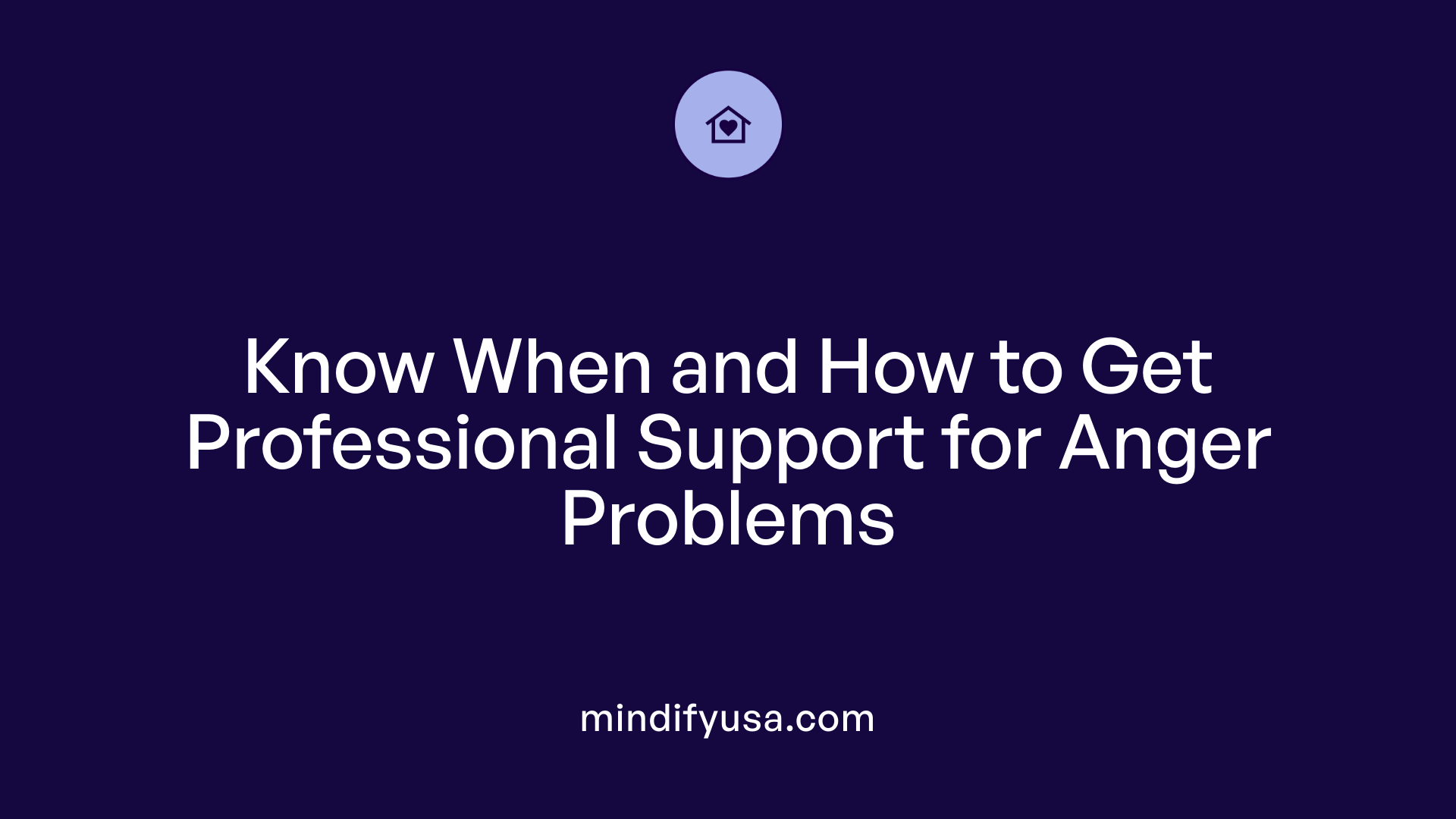Introduction to Adult Anger Issues and Solutions
Anger is a natural emotion, but unmanaged or excessive anger can lead to harmful consequences affecting health, relationships, and overall wellbeing. Understanding the causes, symptoms, and management strategies of adult anger issues is essential for fostering healthier emotional responses. This article explores the common triggers and signs of anger, effective techniques for control, practical self-help methods, and the importance of professional support for long-term management.
The Root Causes of Adult Anger

What are the common causes of adult anger issues?
Adult anger problems often stem from a mixture of psychological, environmental, physiological, and genetic factors. Recognizing these causes can help in developing effective management strategies.
Psychological factors include mental health conditions such as depression, bipolar disorder, obsessive-compulsive disorder (OCD), attention-deficit/hyperactivity disorder (ADHD), oppositional defiant disorder, and intermittent explosive disorder. Many of these conditions feature irritability or rage as core symptoms, making emotional regulation challenging.
External influences are significant contributors to adult anger. Stressful life events, ongoing anxiety, frustration from unmet expectations, and unresolved trauma—such as abuse or bullying—can all trigger intense anger responses. Past adverse experiences often leave a lasting impact, influencing how anger is expressed or suppressed.
Environmental and situational factors also have a profound effect. Long waits in lines, traffic jams, or significant personal losses like the death of a loved one or divorce can escalate frustration. Experiences of discrimination or ongoing life difficulties, such as financial struggles or job insecurity, can serve as persistent triggers.
Physiological and health-related causes include hormonal fluctuations, physical health problems, and substance misuse. Conditions such as thyroid imbalances or neurological issues might lead to increased irritability. Excessive alcohol consumption or recreational drug use can impair judgment and amplify anger responses. Poor sleep patterns and an unhealthy lifestyle further diminish emotional resilience.
Genetics and upbringing contribute to how adults process and display anger. Some individuals inherit tendencies toward heightened emotional reactivity. Family environment and parenting styles shape early emotional regulation skills, influencing adult behaviors.
| Cause Category | Specific Factors | Additional Notes |
|---|---|---|
| Mental Health Conditions | Depression, Bipolar, OCD, ADHD, DOD, IED | Symptoms include irritability, rage |
| External Pressures | Stress, Anxiety, Frustration | Often precipitated by unresolved issues |
| Past Trauma | Abuse, Bullying | Long-lasting impact on emotional responses |
| Environmental Factors | Traffic, Waits, Discrimination | Situational catalysts for anger |
| Physical & Lifestyle Factors | Hormonal Changes, Sleep, Substance misuse | Affect emotional stability |
| Genetics & Upbringing | Hereditary traits, Parenting Style | Influence emotional processing |
Understanding these multiple influences illustrates that adult anger issues are multifaceted. Addressing them often requires a comprehensive approach, including therapy, lifestyle changes, and sometimes medical intervention.
Seeking professional help can facilitate the identification of root causes and the development of tailored coping strategies. Whether through cognitive-behavioral therapy, medication, stress management techniques, or lifestyle adjustments, tackling the underlying factors is essential for healthier emotional regulation.
For those seeking to delve deeper into this topic, searching for "causes of adult anger issues and triggers" can provide additional insights and resources. Recognizing these triggers and underlying causes is the first step toward effective anger management and overall emotional well-being.
Recognizing Symptoms and Triggers of Anger in Yourself

How can I recognize the symptoms and triggers of anger in myself?
Understanding when you're starting to feel angry is an essential step toward managing it effectively. Physical signs are often the first indicators. For example, you might notice your heart beating faster, muscles tightening, sweating, experiencing headaches, or feeling unusually hot or dizzy. These physical responses signal that your body is reacting to some form of stress or threat.
Mentally, anger can manifest as irritability, constant tension, resentment, or inward feelings of anger such as self-criticism or a desire to withdraw from others. These mental signs serve as internal alarms that your emotional state is shifting.
Externally, you may notice expressions like shouting, criticizing others, sarcasm, or physical actions such as aggression or clenched fists. Sometimes anger is expressed subtly through passive behaviors like self-isolation, or through neglecting responsibilities, arriving late, or completing tasks carelessly.
Triggers that commonly set off these reactions include feeling disrespected, criticized, overwhelmed by demands, or perceiving threats—whether real or imagined. Recognizing these triggers early helps you to understand the situation's context and prepare a healthier response.
To enhance awareness of these symptoms and triggers, consider employing mindfulness techniques. Body scanning exercises, for instance, involve paying close attention to physical sensations to catch early signs of tension. Reflecting on emotional triggers—asking yourself what thoughts or situations typically cause anger—can also be enlightening.
Practicing these awareness tools regularly can significantly improve your ability to detect the onset of anger before it escalates, allowing for timely calming strategies like deep breathing or taking a break. This proactive approach supports healthier emotional regulation and prevents destructive outbursts.
Techniques and Strategies for Managing and Controlling Anger

What are effective techniques for managing and controlling anger?
Managing anger effectively involves a combination of immediate calming techniques and long-term strategies. One of the most useful immediate methods is practicing relaxation techniques. Deep breathing, visualization, and progressive muscle relaxation are popular choices. Deep breathing exercises, such as inhaling slowly through the nose and exhaling out the mouth, help lower physiological arousal like rapid heartbeat and muscle tension.
Visualization involves imagining a peaceful place or positive outcome, helping to divert attention from anger triggers. Progressive muscle relaxation gradually tenses and relaxes muscle groups, releasing tension stored in the body. These approaches help calm the body and mind, making it easier to think clearly and respond rationally.
Cognitive restructuring is another vital tool. It involves identifying and challenging irrational or destructive thoughts that escalate anger. For example, replacing thoughts like "This is unfair" with calmer, more realistic perspectives. Reframing negative thoughts reduces emotional intensity and promotes more measured reactions.
Problem-solving strategies are essential for addressing the underlying issues causing anger. Instead of ruminating or reacting impulsively, individuals learn to analyze the problem constructively, evaluate possible solutions, and take actionable steps for resolution.
Effective communication plays a pivotal role. Using 'I' statements—such as "I feel upset when..."—expresses feelings honestly without blaming others. Active listening and slowing down reactions prevent misunderstandings and reduce hostility. Clarifying the situation and expressing needs calmly can diffuse potential conflicts.
Physical activity is an excellent outlet for pent-up tension. Simple activities like walking, jogging, or other forms of exercise help burn off energy, improve mood, and enhance frustration tolerance over time.
Recognizing early warning signs of anger, like clenched fists, rapid breathing, or flushed face, allows for quick application of calming techniques before anger escalates. Developing a personalized calm-down plan—such as counting to ten, stepping away from the situation, or practicing quick breathing—is highly effective.
Seeking professional help from psychologists or anger management programs is advisable if anger becomes frequent, intense, or harms relationships. Therapies like cognitive-behavioral therapy (CBT) provide tailored strategies and support for managing anger long-term.
Combining these approaches—relaxation, cognitive restructuring, problem-solving, communication, physical activity, and professional support—offers a comprehensive plan to control and reduce anger effectively.
Practical Self-Help Methods to Reduce Anger
What are some practical self-help methods to reduce anger?
Managing anger effectively involves a combination of immediate coping strategies and long-term habits. One of the most straightforward approaches is taking timeouts. When feeling anger brewing, stepping away from the situation allows for a moment to cool down and gather thoughts.
Relaxation exercises are also valuable tools in defusing tension. Techniques such as deep breathing, progressive muscle relaxation, or mindfulness meditation can calm both the mind and body. For example, slow, deep breaths—inhale slowly through the nose, hold briefly, then exhale longer than the inhale—help reduce physiological arousal.
Physical activity provides an outlet for excess energy and frustration. Going for a walk, jogging, or stretching can burn off built-up tension, helping to improve frustration tolerance and foster a sense of control.
Cognitive strategies are equally important. Identifying irrational or negative thoughts, such as catastrophizing or overgeneralizing, and reframing them into rational perspectives can diminish anger triggers. Using 'I' statements—like 'I feel upset when...'—encourages honest, non-confrontational communication.
Managing environmental triggers is another effective method. Creating and using calming routines or objects—often called "calm kits"—can serve as sensory anchors during stressful moments. These kits might include soothing objects, calming music, or guided meditation recordings.
Avoiding known triggers, such as stressful environments or excessive caffeine, promotes emotional balance. Spending time in nature or engaging in creative activities like art or writing allows for emotional expression and distraction from anger-inducing stimuli.
Practicing patience and forgiveness can shift focus away from blame and resentment. Recognizing that everyone makes mistakes and that some disagreements are natural helps maintain perspective.
Seeking support from friends, family, or mental health professionals provides additional outlets for expressing feelings and developing healthier coping skills. Therapy or anger management classes can teach personalized strategies to handle difficult emotions.
Incorporating these methods into daily life encourages a healthier approach to emotional regulation. Consistent practice can reduce the frequency and intensity of anger episodes, leading to better relationships and overall well-being.
Long-Term Strategies and Support Options for Anger Management
What long-term strategies and mental health support options are available for managing anger?
Managing anger over the long term involves a combination of professional therapy, personal skill development, lifestyle adjustments, and ongoing support mechanisms.
One of the most effective approaches is engaging in therapy, especially cognitive-behavioral therapy (CBT). CBT helps individuals recognize negative thought patterns and behaviors that contribute to anger. By working with a trained psychologist, adults can learn to reframe their thoughts, develop healthier responses, and reduce the frequency and intensity of angry outbursts.
In addition to therapy, practicing relaxation and mindfulness techniques regularly can make a significant difference. Activities such as yoga, visualization exercises, and deep breathing promote calmness by reducing physiological arousal associated with anger. These techniques help individuals gain better control over their reactions when faced with stressors.
Developing essential skills like problem-solving, assertive communication, and conflict management also plays a crucial role. These skills enable adults to address issues calmly and effectively, preventing small disagreements from escalating into anger outbursts.
Creating a personalized anger management plan tailored to individual triggers and warning signs is another effective long-term strategy. This plan may include identifying specific triggers such as traffic, workload, or relationship issues, and outlining appropriate coping actions.
Lifestyle factors significantly influence emotional regulation. Maintaining good sleep hygiene, engaging in regular physical activity, following a balanced diet, and avoiding substances like alcohol and recreational drugs support mental well-being and reduce irritability.
Ongoing professional support is vital. Continuing therapy sessions, attending anger management programs, or joining support groups provide a structured environment to practice new skills, share experiences, and stay accountable.
Self-awareness tools such as journaling, meditation, and reflection can reinforce progress in managing anger. Regularly recording triggers, emotional responses, and coping successes helps individuals understand their patterns and maintain gains.
In summary, long-term anger management combines active participation in therapy, lifestyle improvements, skill-building, and persistent self-awareness. These strategies contribute to healthier emotional expression, improved relationships, and overall well-being.
| Strategy Area | Specific Actions | Additional Details |
|---|---|---|
| Professional Support | Cognitive-behavioral therapy, anger management programs, group therapy | Usually involves weekly sessions with trained therapists |
| Relaxation & Mindfulness | Yoga, visualization, deep breathing exercises | Helps reduce physiological and emotional tension |
| Skills Development | Problem-solving, assertive communication, conflict resolution | Prevents triggers from escalating into anger |
| Personalized Planning | Trigger identification, warning sign recognition, coping strategies | Tailored to individual needs |
| Lifestyle Factors | Adequate sleep, regular exercise, healthy diet, avoiding substances | Supports overall mental health and stress resilience |
| Continued Support | Ongoing therapy, self-monitoring, support groups | Maintains long-term progress |
Long-term anger management requires consistent effort and adaptation. Staying connected with mental health professionals, practicing core relaxation techniques, and nurturing supportive habits facilitate a calmer, more balanced emotional life. This comprehensive approach ensures that anger remains a manageable and constructive part of daily living.
When and How to Seek Professional Help for Anger Issues

When and how should I seek professional help for managing anger issues?
Recognizing when to seek help for anger problems is essential for maintaining healthy relationships and personal well-being. You should consider reaching out to a mental health professional if your anger episodes are frequent, intense, or lead to problematic situations such as conflicts, harm to others, or legal issues.
Persistent anger that damages your relationships or causes significant distress to you or those around you indicates the need for professional intervention. Symptoms like unable to control outbursts, ongoing irritability, or feeling overwhelmed by anger should not be ignored.
Trained professionals such as psychologists, psychiatrists, or clinical social workers can provide assessment and tailored treatment plans. Common approaches include cognitive-behavioral therapy (CBT), which helps identify and reframe negative thought patterns, dialectical behavior therapy (DBT), which teaches emotional regulation, or psychodynamic therapy that explores underlying emotional issues.
Group or individual therapy sessions are beneficial, offering safe environments to explore triggers, understand underlying thoughts, and practice new coping strategies. These settings also provide support and feedback from peers, which can accelerate progress.
If you notice your anger spiraling out of control—such as increasing frequency and intensity, or leading to harmful behaviors—it’s critical to seek help promptly. Persistent anger that does not decrease despite self-help techniques may require professional guidance.
In an emotional crisis or if you feel at risk of harming yourself or others, immediate support is available through hotlines or specialized organizations. They can provide urgent assistance and help you develop strategies to manage your anger safely.
Overall, seeking professional help is a proactive step in gaining control over anger, improving emotional health, and fostering better relationships. It signifies acknowledging the problem and being committed to change.
| Indicator for Help | Description | Recommended Action |
|---|---|---|
| Frequent outbursts | Recurrent episodes of intense anger in various situations | Contact a therapist or counselor for assessment |
| Relationship harm | Angry outbursts negatively affect personal or professional relationships | Seek individual or group therapy |
| Distress or impairment | Feeling overwhelmed or unable to function due to anger | Reach out to mental health services |
| Legal or violent episodes | Incidents involving violence or legal consequences | Urgently consult with mental health and legal professionals |
Recognizing the signs early and taking action can lead to more effective management, better health outcomes, and healthier interactions.
Understanding the Importance of Anger Management and Its Benefits

Why is anger management important, and what benefits does it offer?
Managing anger is crucial for maintaining good health, healthy relationships, mental stability, and overall wellbeing. Uncontrolled anger can cause serious health issues like high blood pressure, heart problems, and stress-related illnesses. It also impacts social interactions by leading to conflicts, misunderstandings, and emotional distance between individuals.
Effective anger management skills help individuals control their emotions, communicate better, and reduce impulsive or aggressive behaviors. This proactive approach not only minimizes immediate conflicts but also fosters healthier, more meaningful relationships.
Long-term practice of anger control techniques enhances mental health by decreasing stress, improving emotional stability, and promoting a positive outlook on life. It empowers people to deal with challenges calmly and constructively.
Furthermore, mastering these skills improves overall quality of life. People become more capable of forming strong social bonds, experiencing greater personal satisfaction, and maintaining healthier lifestyles.
The psychological benefits extend to better coping mechanisms for dealing with daily frustrations and unforeseen setbacks. Regular engagement in anger management strategies can lead to calmer reactions and a more resilient mental state.
Health Benefits:
- Reduction in risk of high blood pressure and cardiovascular issues.
- Better sleep due to lower stress levels.
- Decreased physical symptoms like headaches and muscle tension.
Relationship Benefits:
- Improved communication skills.
- Fewer conflicts and misunderstandings.
- Stronger emotional bonds.
Mental Health Improvements:
- Greater emotional regulation.
- Reduced anxiety and depression.
- Enhanced self-esteem and self-awareness.
Overall Wellbeing:
- Higher quality of life.
- More satisfying social interactions.
- Increased resilience to stressors.
| Aspect | Benefits | Additional Notes |
|---|---|---|
| Physical Health | Reduced risk of cardiovascular disease, better sleep | Stress-related symptoms decrease with reduced anger |
| Emotional & Mental | Greater emotional regulation, less anxiety, improved mood | Helps in managing daily frustrations effectively |
| Relationships | Fewer conflicts, improved communication | Strengthens bonds and fosters understanding |
| Lifestyle | Better social interactions, higher life satisfaction | Contributes to overall happiness and health |
Engaging in anger management is a practical step toward a healthier, more fulfilling life. Whether through therapy, relaxation techniques, or developing awareness of emotional triggers, each effort contributes to a more balanced, peaceful existence.
Final Thoughts on Effective Anger Management
Managing adult anger issues is a multifaceted process requiring awareness, skills, practice, and sometimes professional assistance. Recognizing triggers and symptoms early, employing immediate control techniques, and adopting long-term strategies such as therapy, lifestyle adjustments, and ongoing support can substantially improve emotional regulation. The goal is to express feelings healthily without losing control, thereby enhancing wellbeing and relationships. If anger becomes unmanageable or causes harm, seeking professional help is crucial for lasting change. With commitment and appropriate tools, adults can achieve better control over their anger, leading to a healthier and more fulfilling life.
References
- Anger management: 10 tips to tame your temper
- Control anger before it controls you
- 11 Anger Management Strategies to Help You Calm Down
- Anger Management: Help for Anger Issues
- Anger | Tips for coping with anger right now
- Anger management workbook
- 11 Anger Management Therapy Techniques and ...
- Anger Management: What It Is, Skills & Techniques
- Get help with anger





































































































